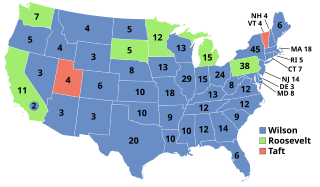
The Balkan Wars consisted of two conflicts that took place in the Balkan Peninsula in 1912 and 1913. Four Balkan states defeated the Ottoman Empire in the First Balkan War. In the Second Balkan War, Bulgaria fought against all four original combatants of the first war along with facing a surprise attack from Romania from the north. The Ottoman Empire lost the bulk of its territory in Europe. Austria-Hungary, although not a combatant, became relatively weaker as a much enlarged Serbia pushed for union of the South Slavic peoples. The war set the stage for the Balkan crisis of 1914 and thus served as a "prelude to the First World War".

Cubism is an early-20th-century avant-garde art movement that revolutionized European painting and sculpture, and inspired related movements in music, literature and architecture. In Cubist artwork, objects are analyzed, broken up and reassembled in an abstracted form—instead of depicting objects from a single viewpoint, the artist depicts the subject from a multitude of viewpoints to represent the subject in a greater context. Cubism has been considered the most influential art movement of the 20th century. The term is broadly used in association with a wide variety of art produced in Paris or near Paris (Puteaux) during the 1910s and throughout the 1920s.

The 1912 United States presidential election was the 32nd quadrennial presidential election, held on Tuesday, November 5, 1912. Democratic Governor Woodrow Wilson unseated incumbent Republican President William Howard Taft and defeated former President Theodore Roosevelt, who ran under the banner of the new Progressive or "Bull Moose" Party. As of 2021, this is the most recent presidential election in which the second-place candidate was neither a Democrat nor a Republican.

James Francis Thorpe was an American athlete and Olympic gold medalist. A member of the Sac and Fox Nation, Thorpe became the first Native American to win a gold medal for the United States. Considered one of the most versatile athletes of modern sports, he won two Olympic gold medals in the 1912 Summer Olympics, and played American football, professional baseball, and basketball. He lost his Olympic titles after it was found he had been paid for playing two seasons of semi-professional baseball before competing in the Olympics, thus violating the amateurism rules that were then in place. In 1983, 30 years after his death, the International Olympic Committee (IOC) restored his Olympic medals with replicas after ruling that the decision to strip him of his medals fell outside of the required 30 days, but he is to date listed as co-champion in both the decathlon and pentathlon events according to official IOC records.

The 1912 Summer Olympics, officially known as the Games of the V Olympiad, were an international multi-sport event held in Stockholm, Sweden, between 5 May and 22 July 1912.

Abstract art uses visual language of shape, form, color and line to create a composition which may exist with a degree of independence from visual references in the world. Western art had been, from the Renaissance up to the middle of the 19th century, underpinned by the logic of perspective and an attempt to reproduce an illusion of visible reality. By the end of the 19th century many artists felt a need to create a new kind of art which would encompass the fundamental changes taking place in technology, science and philosophy. The sources from which individual artists drew their theoretical arguments were diverse, and reflected the social and intellectual preoccupations in all areas of Western culture at that time.
A feature film or feature-length film is a narrative film with a running time long enough to be considered the principal or sole presentation in a commercial entertainment program. The term feature film originally referred to the main, full-length film in a cinema program that also included a short film and often a newsreel. The notion of how long a feature film should be has varied according to time and place. According to the Academy of Motion Picture Arts and Sciences, the American Film Institute and the British Film Institute, a feature film runs for more than 40 minutes, while the Screen Actors Guild asserts that a feature's running time is 75 minutes or longer.

The First Balkan War lasted from October 1912 to May 1913 and involved actions of the Balkan League against the Ottoman Empire. The Balkan states' combined armies overcame the initially numerically inferior and strategically disadvantaged Ottoman armies and achieved rapid success.

The Italo-Turkish or Turco-Italian War was fought between the Kingdom of Italy and the Ottoman Empire from September 29, 1911, to October 18, 1912. As a result of this conflict, Italy captured the Ottoman Tripolitania Vilayet (province), of which the main sub-provinces (sanjaks) were Fezzan, Cyrenaica, and Tripoli itself. These territories became the colonies of Italian Tripolitania and Cyrenaica, which would later merge into Italian Libya.

Elections to the United States House of Representatives in 1912 were held for members of the 63rd Congress, coinciding with the election of President Woodrow Wilson.

The United States occupation of Nicaragua from 1912 to 1933 was part of the Banana Wars, when the US military invaded various Latin American countries from 1898 to 1934. The formal occupation began in 1912, even though there were various other assaults by the U.S. in Nicaragua throughout this period. American military interventions in Nicaragua were designed to stop any other nation except the United States of America from building a Nicaraguan Canal.

In the United States Senate elections of 1912 and 1913, Democrats gained control of the Senate from the Republicans. Of the 32 seats up for election, 17 were won by Democrats, thereby gaining 4 seats from the Republicans. Two seats were unfilled by state legislators who failed to elect a new senator on time. They were the last Senate elections held before ratification of the 17th Amendment, which established direct elections for all seats in the Senate.

The 1912 Republican National Convention was held at the Chicago Coliseum, Chicago, Illinois, from June 18 to June 22, 1912. The party nominated President William H. Taft and Vice President James S. Sherman for re-election for the 1912 United States presidential election.

The Progressive Party was a third party in the United States formed in 1912 by former president Theodore Roosevelt after he lost the presidential nomination of the Republican Party to his former protégé and conservative rival, incumbent president William Howard Taft. The new party was known for taking advanced positions on progressive and populist reforms and attracting leading national reformers. After the party's defeat in the 1912 presidential election, it went into rapid decline in elections until 1918, disappearing by 1920. The Progressive Party was popularly nicknamed the "Bull Moose Party" when Roosevelt boasted that he felt "strong as a bull moose" after losing the Republican nomination in June 1912 at the Chicago convention.

The Republic of China calendar or Minguo calendar is one of the calendars used in the Greater China area. The calendar uses 1912, the year of the establishment of the Republic of China (ROC), as the first year. The term "minguo" simply means "republic". The ROC calendar follows the tradition of using the sovereign's era name and year of reign, as did previous Chinese dynasties. Months and days are numbered according to the Gregorian calendar. The ROC calendar has been in wide use in the ROC since 1912, including in early official documents.

RMS Titanic was a British passenger liner operated by the White Star Line that sank in the North Atlantic Ocean on 15 April 1912, after striking an iceberg during her maiden voyage from Southampton to New York City. Of the estimated 2,224 passengers and crew aboard, more than 1,500 died, making the sinking at the time one of the deadliest of a single ship and the deadliest peacetime sinking of a superliner or cruise ship to date. With much public attention in the aftermath, the disaster has since been the material of many artistic works and a founding material of the disaster film genre.

The Republic of China (ROC) from 1912 to 1949, commonly known as China, was a sovereign state based in mainland China prior to the relocation of its government to Taiwan. At a population of 541 million in 1949, it was the world's most populous country. Covering 11.4 million square kilometres, it consisted of 35 provinces, 1 special administrative region, 2 regions, 12 special municipalities, 14 leagues, and 4 special banners. This period is sometimes referred to as the Republican Era or the Mainland Period.

The 1912 United States elections elected the members of the 63rd United States Congress, occurring during the Fourth Party System. Amidst a division between incumbent Republican President William Howard Taft and former Republican President Theodore Roosevelt, the Democratic Party won the Presidency and both chambers of Congress, the first time they accomplished that feat since the 1892 election.















